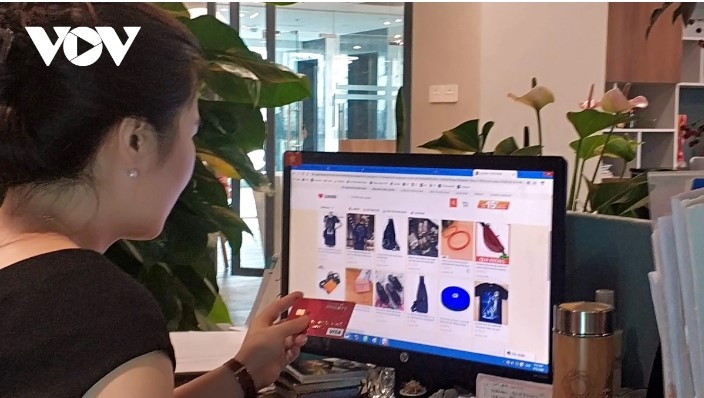E-commerce growth helps to boost exports of Vietnamese products
VOV.VN - E-commerce achieved its growth target of 18-20% in 2024, surpassing US$25 billion. With new growth drivers, this market is projected to exceed US$30 billion in 2025, provided domestic enterprises receive support to accelerate exports via e-commerce.
Currently, Vietnam's micro, small, and medium enterprises (MSMEs) face both opportunities and challenges in cross-border e-commerce. Among surveyed MSMEs engaged in cross-border e-commerce, 93% affirmed that exporting would not be possible without platforms like Amazon Global Selling, Alibaba, or eBay. High logistics costs, a lack of skilled workforce, and limited knowledge of foreign markets are among significant barriers that deter MSMEs from expanding their investments in cross-border e-commerce.
Acknowledging that many localities, industries, and enterprises have yet to fully tap into the potential of e-commerce for promotion and distribution, Nguyen Lam Thanh, general director of TikTok Vietnam, shared that over the past two years, TikTok has undertaken programmes on digital and green transformation to enhance digital skills for localities.
“On the TikTok platform, through unique perspectives and storytelling by content creators, products can gain widespread exposure. TikTok's goal is to build brands for products, including their cultural, historical, and origin stories, thereby boosting consumption and driving socio-economic development,” emphasized the TikTok CEO.
At present, 95% of surveyed Vietnamese MSMEs reported difficulties in finding high-quality human resources for cross-border e-commerce. Businesses acknowledge their lack of understanding of import regulations via e-commerce in foreign markets and seek additional training.
As Vietnam enters the initial stages of online exports, 2025 will be a pivotal year to transition online exports into a takeoff phase by 2026. Doan Quoc Tam, head of Cooperation under the Vietnam E-commerce Association (VECOM), stated that the first condition for online exports to take off is for MSMEs to proactively invest in high-quality human resources. These should include those proficient in foreign languages, capable of creative product development, and building brands that meet the demands of online customers abroad.
“In addition to creating their own websites or mobile applications, MSMEs should leverage reputable global online export platforms to quickly access international markets. Government agencies in e-commerce, the digital economy, logistics, and customs should monitor development trends, consider online exports an integral part of e-commerce, and propose specific policies and solutions to effectively support MSMEs in online exports,” suggested Tam.
To support the MSME community facing numerous challenges in online exports, Nguyen Thi Minh Huyen, deputy director of the Department of E-commerce and Digital Economy under the Ministry of Industry and Trade, said that the department has requested the E-commerce Development Center to research and develop an online export ecosystem (Ecomex) with specific solutions to realize the government's vision of assisting Vietnamese enterprises in bringing potential export products to international markets via e-commerce.
“In addition, the Department of E-commerce and Digital Economy regularly organizes training programmes on e-commerce in general and cross-border e-commerce in particular, to enhance the quality of human resources and disseminate updated regulations, procedures, and knowledge to government officials and the business community,” added Huyen.
The Ministry of Industry and Trade is accelerating the development of the draft plan on national e-commerce development for 2026-2030. The draft positions online exports as a vital component of e-commerce development, while proposing specific goals, policies, and solutions to effectively support MSMEs in online exports.
Setting ambitious goals for online exports, alongside strong coordination and support from government agencies, will drive domestic MSMEs to invest and develop into global brands.


